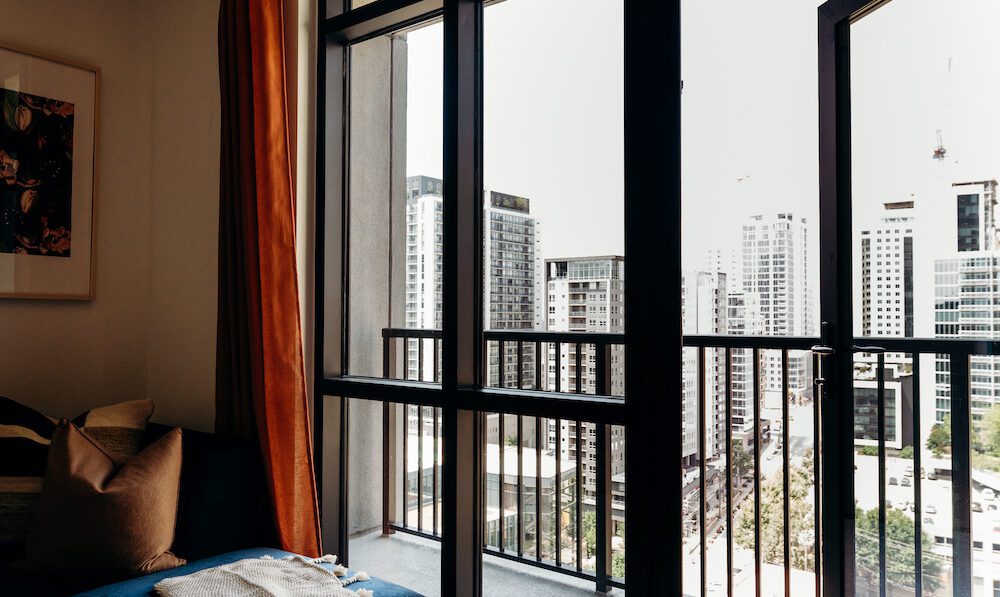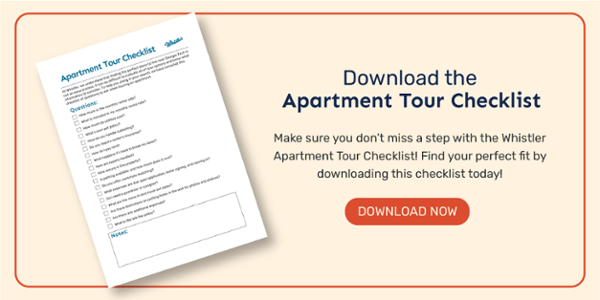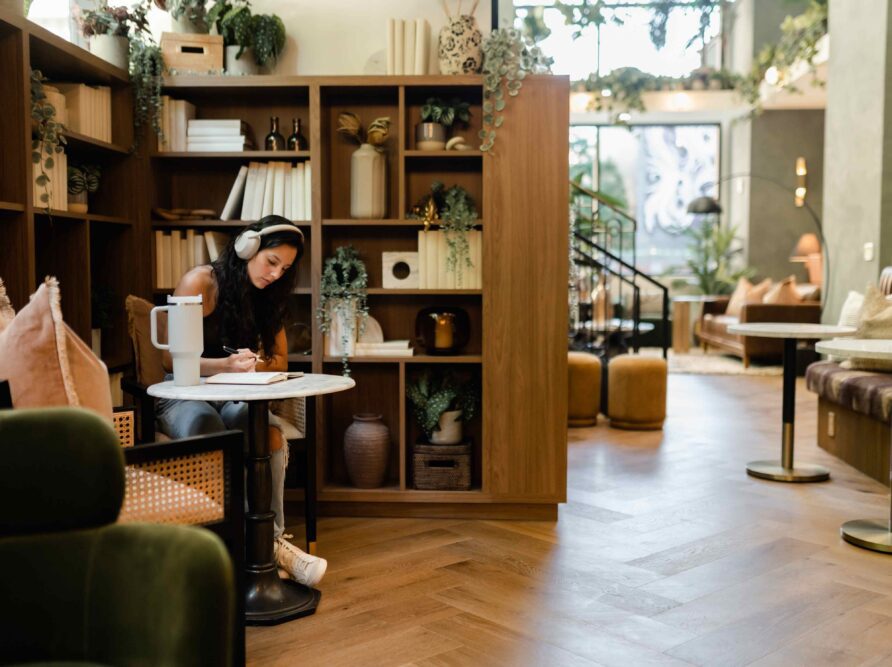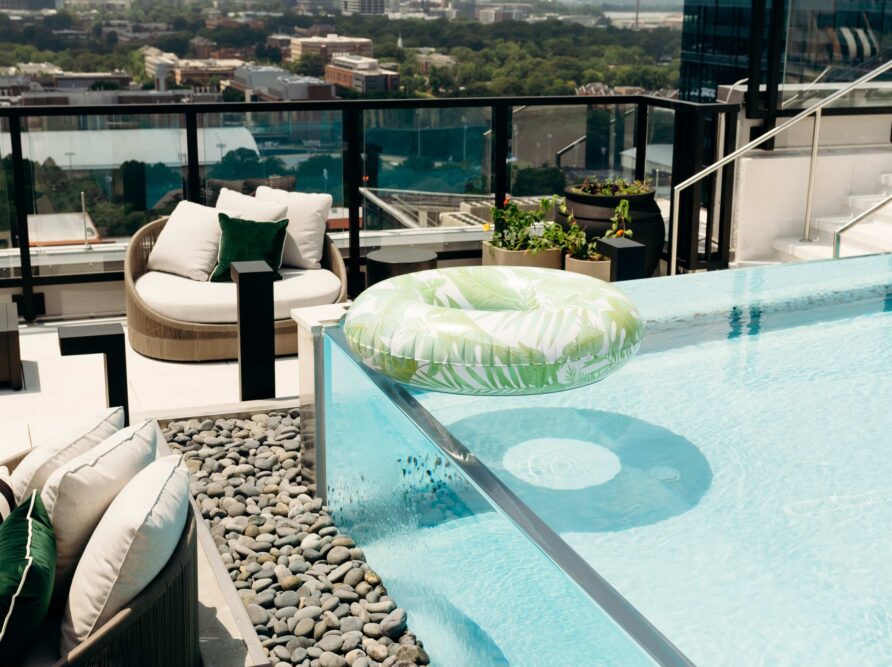Picking a place to live near Georgia Tech can be a long and strenuous process. Location, amenities and cost are just a few of the many important factors to consider when making your decision.
Read Next: 8 Steps to Finding the Perfect Student Apartment Near Georgia Tech
At Whistler, we understand how hard it can be to evaluate your options and know what information to consider. To help you along in your student housing search, we have compiled a list of essential questions to ask when touring an off-campus apartment.
15 Questions to Ask Before Signing a Lease at a Student Apartment near Georgia Tech
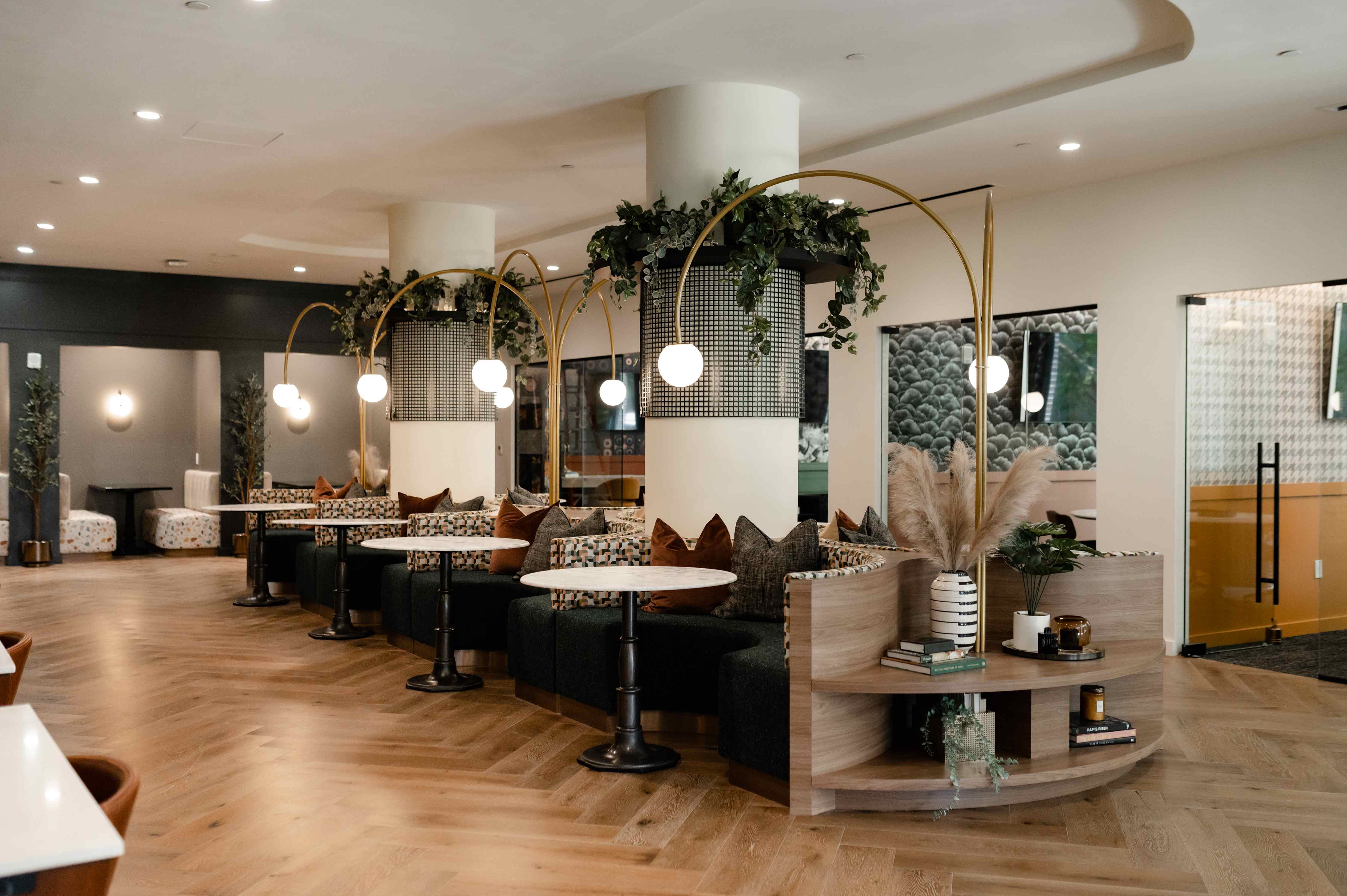
A variety of study spaces are available to students at Whistler, located at 859 Spring Street NW.
1. What are the specific lease terms?
Reading through a long lease with complicated terminology can be overwhelming. Asking questions about specific lease terms while on your tour can help you get direct and clear answers. Some information you might want to inquire about include:
- What are the move-in and move-out dates?
- What is the subleasing policy?
- Are there restrictions on putting holes in the wall for photos and shelves?
- Are there any additional expenses?
- What is the late fee policy?
- Is there on-site parking available?
Read Next: How to Sign a Lease at a Student Apartment in Midtown
2. What is included in my monthly rental rate?
It is important to know what is included in your monthly rental rate to determine what kind of additional fees you may accumulate. A few costs to consider are:
- Utilities: Utilities will normally come as a separate fee, but can sometimes be included in monthly rates.
- Water: Opposite of utilities, water is normally factored into your monthly rate, but can sometimes come at an additional fee to the tenant.
- WiFi: Many student apartments include wifi costs in their monthly rates, so check to see if wifi is part of your rate or if it will come at an additional cost.
- Cable: Some student housing locations in the Midtown area will include cable in your monthly rental rate.
- Trash: Trash service is normally included in student apartments, but may come at an additional cost.
Read Next: 10 Additional Costs To Consider When Living Off-Campus
3. How much do utilities cost?
Whether or not utilities are included in your rental rate can factor into your total cost of living off-campus.
Ask what kind of utilities are and are not included, and what the typical monthly rate is for utilities to get a better understanding of the total cost per month. If the leasing office is uncertain of what the average utility cost is, contact your local provider for an estimate.
Read Next: How Much Do Utilities Cost at a Midtown Apartment?
4. What is your pet policy?
If you plan on bringing your furry friend to live with you in your future apartment, it’s a good idea to ask what the pet policy is.
Ask if pets are allowed, at what costs, and what restrictions there are on size and breed. Costs for living with a pet typically include a non-refundable pet deposit, monthly pet rent, or both.
5. How do you handle subletting?
Many Georgia Tech students use the summers to study abroad, take an internship in another city, or visit home for a month or two.
If you plan on spending an extended period of time away from your Midtown apartment and are interested in subletting your space to someone else during that time, be sure to ask about the subletting policy.
The terms will likely be clarified in your lease, but it is a good idea to ask the landlord directly for more clarity on the policies. Subletting without permission or without following the terms of your lease can lead to legal issues.
Read Next: 7 Tips for Subletting (or Reletting) your Midtown Apartment
6. Do you require renter’s insurance?
Renter’s insurance can provide you with coverage for unexpected events like fires, floods, theft, etc. Some policies will even cover injuries that occur in your apartment. Depending on what apartment complex you choose, renter’s insurance policies vary. Some places require renter’s insurance, while others offer their own at a small fee, so it’s important to ask what each apartment’s policy is.
Read Next: Student Guide to Renter’s Insurance
7. How do I pay rent?
No one likes to pay a late fee. Ask when rent is due and how payment is accepted to ensure you have clarity on the payment process.
Popular payment options include auto-pay, online manual payments, and in some cases, paying with an old-fashioned check.
If you are the forgetful type, it may be to your advantage to utilize the auto-pay option. Many college students choose this form of payment because it saves time, avoids late fees, and gives peace of mind that rent will always be paid. No matter what option you chose, it’s good to know what payment processes your apartment complex offers.
8. What happens if I need to break my lease?
Having to break a lease is never planned, but life happens and it’s important to know what steps to take in the event that you do need to break your lease.
Depending on your apartment’s policy, you could be subject to heavy fees. If you are uncertain about your ability to take on a year-long lease, make sure you know the penalties for breaking your contract before you sign.
9. How are repairs handled?
Maintenance speed and efficiency are key to ensuring your living experience will not be significantly altered when something in your apartment breaks or isn’t working correctly. Ask if maintenance is available 24/7, how are emergency repairs handled, and what the average response time is.
10. How secure is the property?
Feeling safe in your new home is of the utmost importance. Be sure to ask your tour guide about the security features of the building. Ask specific questions regarding the building’s external security, like whether or not there is a buzzer system if you need a key fob for entry, and if there is 24/7 security.
If there is a parking garage, ask about the safety of walking from the garage to the building once you have parked.
Within your own apartment, ask if your front door has deadbolts and if each bedroom has an individual lock.
11. How often does rent typically increase, and by how much?
Even if it is not stated in your rental agreement, rental rates can sometimes increase upon renewing your lease each year. If you are planning on living in your apartment for longer than your original lease period, ask if rates normally increase upon renewal and by how much to prepare for future costs of living.
12. Is parking available, and how much does it cost?
With parking in Atlanta being so limited, most student apartments in the Midtown area will come with an on-site parking garage. These spots will typically be first come, first served at an additional cost per month. Ask how much a parking pass will be per month so you can factor it into your total cost of living.
Read Next: Ultimate Guide to Parking Near Georgia Tech
13. Do you have roommate matching?
Once you have found your perfect apartment, you want to ensure you have the perfect roommates to live there with you. If you want roommate(s), many student apartments offer a roommate matching system that will pair you with roommates based on a quick questionnaire. If you know you will be interested in this type of program, ask if your apartment complex offers any roommate matching services.
Read Next: Roommate Matching at Whistler: What Is It? How Does It Work?
14. What expenses are due upon application, lease signing and move-in?
To avoid any surprise fees on move-in day or the day you sign the lease, ask about any additional upcoming fees you could be subject to. Common fees include:
- Application Fee: This generally non-refundable fee covers the costs of approving your application. This includes background checks and screening your guarantor.
- Admin Fee: Paid the day of signing your lease, this non-refundable, one-time fee covers any administrative service costs. It includes billing, bill auditing, and similar expenses the leasing office will incur throughout your time as a tenant.
- Security Deposit: This is a refundable deposit that will be returned if no damage (other than typical wear) is done to your apartment during the time frame of your lease.
Read Next: 10 Additional Costs and Fees to Consider When Looking for a Student Apartment in Midtown
15. Do I need a guarantor or co-signer?
If you are like most students and only work part-time or do not work at all, you will likely need a guarantor in order to sign a lease. A guarantor is a co-signer, typically a parent or guardian, that will be held responsible for any payments you cannot or do not make. Ask whether or not you will need a guarantor and how the lease signing process works.
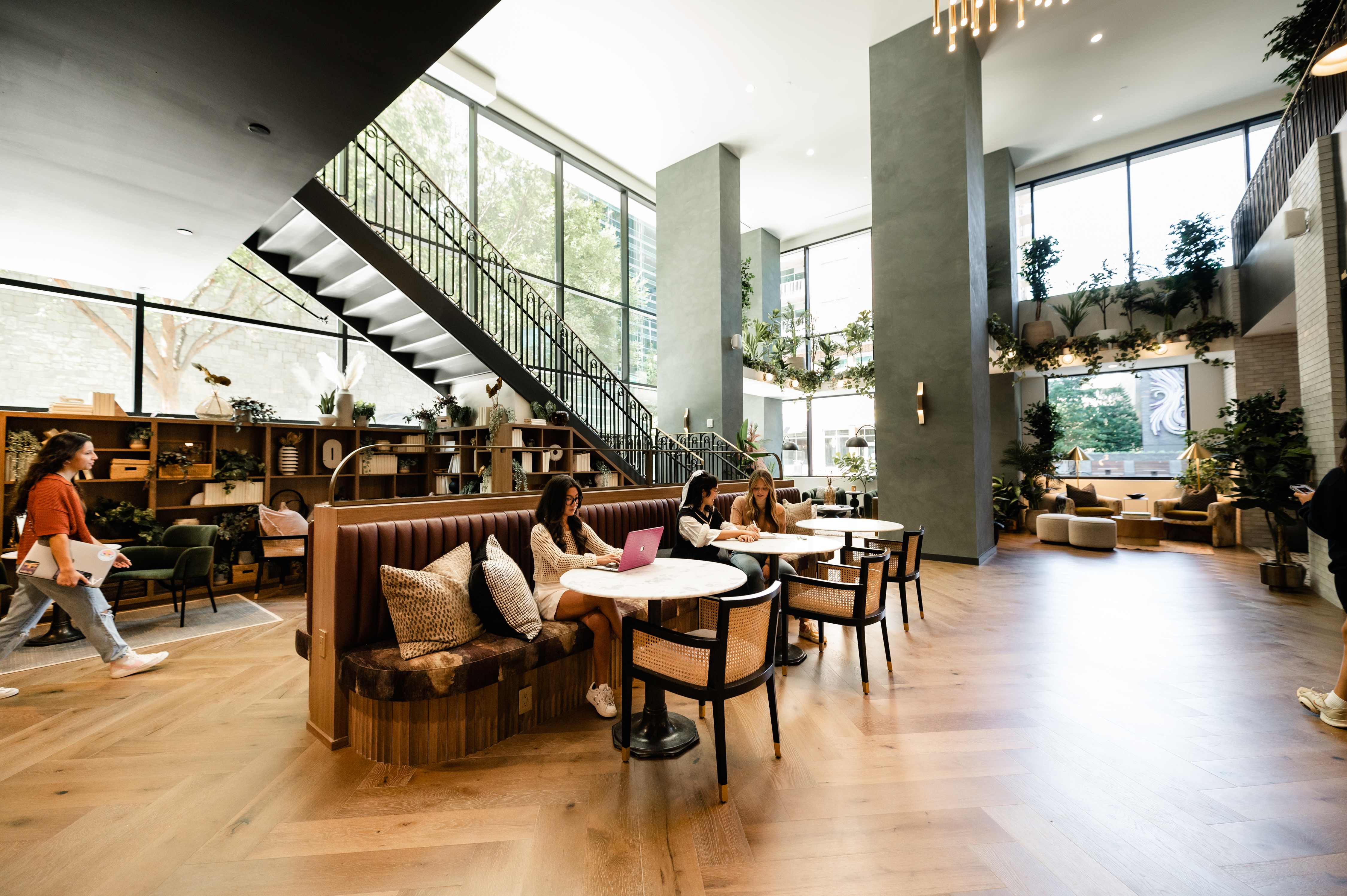
Whistler’s lobby and mezzanine provide a comfortable space to gather.
Apartment tours are an exciting start to your housing search. Download our apartment tour checklist before you go to help evaluate your options and get the most out of your tour.
We hope that this guide helps you feel equipped to ask plenty of questions and get all the information you need before making any final decisions. If you have any further questions or would like to learn more about Whistler, contact our leasing office!
